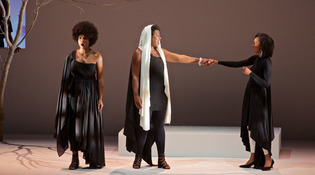 loading
loading
Last LookAmazing GraceA theater piece by Carrie Mae Weems explores the current cultural moment in America’s racial history.  William StruhsView full imageIn September, numerous Yale divisions underwrote two performances of Grace Notes: Reflections for Now, a project by MacArthur Fellow Carrie Mae Weems. The work, inspired by President Obama’s rendition of “Amazing Grace” after the 2015 Charleston church shooting, uses multiple art forms—poetry and interpretive movement, archival footage and spoken word, video and song (shown here)—to explore the current cultural moment in America’s racial history. During the performances at the University Theatre, a live pit orchestra performed original music, accompanying vignettes that alternated between satire and celebration. One short film showed the shadows of two women in Marie Antoinette costume, drinking tea and telling racist jokes. Step dancers honored the Black Lives Matter movement. A young black man, carrying a suitcase in one hand and holding up in the other a large, heavy tangle of what looked like thorns, listened as a sanctimonious voice intoned advice on getting ahead in the world. Intervals of poetry and song, as well as spoken reflections by Weems, brought in high-minded intellectualism melded with realism. At the end, a cast member read out the long list of names of recent African American shooting victims. The refrain of the piece, recurring again and again, was: “How do you measure a life?”
The comment period has expired.
|
|